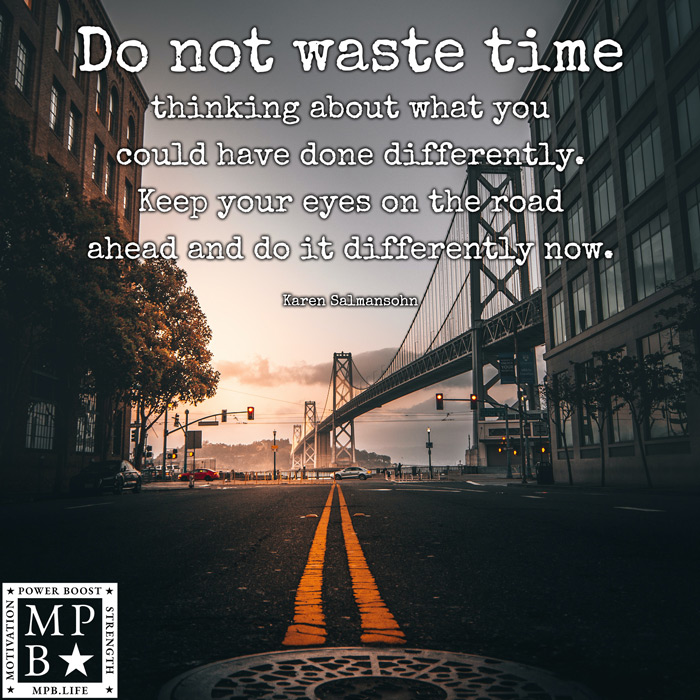
Do Not Waste Time Thinking About What You Could Have Done Differently Graphic © motivationpowerboost.com
Do not waste time thinking about what you could have done differently.
Keep your eyes on the road ahead and do it differently now.
– Karen Salmansohn
Regret: The Anchor That Keeps Us Stuck
We’ve all been there – caught in the relentless grip of regret, replaying past mistakes and missed opportunities on an endless loop. It’s a vicious cycle that can leave us feeling stuck, helpless, and unable to move forward. But as Karen Salmansohn wisely reminds us, dwelling on what we could have done differently is a fruitless endeavor that only serves to waste precious time and energy.
The truth is, we cannot change the past, no matter how much we may wish to. Every decision we’ve made, every action we’ve taken, has led us to this precise moment in time. And while it’s important to learn from our mistakes, it’s equally crucial to recognize that we are not defined by them.
Instead of allowing regret to anchor us in place, we must choose to cut the cord and set ourselves free. This means shifting our focus from the rearview mirror to the windshield – from what’s behind us to what lies ahead. It means embracing the present moment and all the possibilities it holds, rather than dwelling on what could have been.
Of course, this is easier said than done. The pull of regret can be strong, and it takes conscious effort to resist its gravitational force. But with practice and determination, we can learn to redirect our thoughts and energy towards more productive pursuits.
One powerful way to do this is by setting new goals and taking action towards them. When we have a clear sense of purpose and direction, it becomes much easier to let go of past regrets and focus on the road ahead. Whether it’s pursuing a new career, learning a new skill, or strengthening our relationships, having something to work towards can provide the motivation and momentum we need to keep moving forward.
Another key strategy is to cultivate a sense of self-compassion. Rather than beating ourselves up over past mistakes, we must learn to extend the same kindness and understanding towards ourselves that we would offer to a dear friend. This means acknowledging our humanness, accepting that we are imperfect, and recognizing that everyone makes mistakes.
Ultimately, the key to overcoming regret lies in embracing the present moment and all the possibilities it holds. By keeping our eyes on the road ahead and committing to doing things differently now, we open ourselves up to a world of new opportunities and experiences. We may not be able to change the past, but we have the power to shape our future – and that is a truly liberating realization.
So the next time you find yourself caught in the grip of regret, remember Karen Salmansohn’s wise words. Let go of what you could have done differently, and focus instead on what you can do differently now. Embrace the present, set new goals, and extend yourself the compassion and understanding you deserve. In doing so, you’ll find that the road ahead is filled with endless possibilities – and that’s a journey worth taking.
Reframing Regret: A Path to Growth and Resilience
While letting go of regret is crucial for moving forward, we can also learn to reframe it as a catalyst for personal growth and resilience. Often, the experiences that leave us with the deepest regrets are also the ones that teach us the most profound lessons about ourselves and the world around us.
Rather than viewing regret as a burden to be carried, we can choose to see it as a tool for self-reflection and self-improvement. By examining the choices and circumstances that led to our regrets, we gain valuable insights into our values, strengths, and areas for growth. This process of introspection can help us develop greater self-awareness and make more intentional decisions in the future.
Moreover, overcoming regret requires us to cultivate resilience – the ability to bounce back from adversity and adapt to changing circumstances. Each time we confront our regrets head-on and make the conscious choice to move forward, we strengthen our mental and emotional fortitude. We learn that we possess the inner resources to navigate life’s challenges and emerge stronger on the other side.
It’s also important to recognize that regret is a universal human experience. We all make mistakes and encounter situations we wish we could do over. By acknowledging this shared reality, we can offer ourselves compassion and understanding, rather than harsh self-judgment. This self-compassion, in turn, can help us break the cycle of rumination and self-blame that often accompanies regret.
Ultimately, reframing regret as an opportunity for growth and resilience can empower us to engage with life more fully and fearlessly. When we understand that our mistakes and missteps are not permanent states, but rather stepping stones on a journey of self-discovery, we can approach each day with a sense of curiosity and possibility. We can take risks, embrace challenges, and view setbacks as opportunities to learn and evolve, rather than sources of shame or paralysis.
Related Inspirational Quotes
” What’s done is done. What’s gone is gone. One of life’s lessons is always moving on. It’s okay to look back to see how far you’ve come but keep moving forward.” – Roy T. Bennett
“You can’t start the next chapter of your life if you keep re-reading the last one.” – Michael McMillian
“Let go of the past so you can move forward into a new chapter of your life.” – Jennifer Young
“Holding onto anger is like drinking poison and expecting the other person to die.” – Buddha
“Don’t dwell on what went wrong. Instead, focus on what to do next. Spend your energies on moving forward toward finding the answer.” – Denis Waitley
